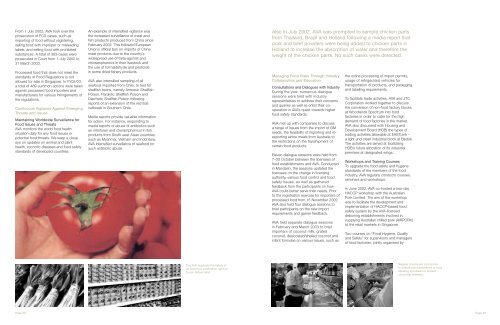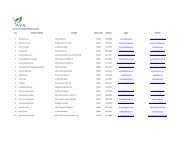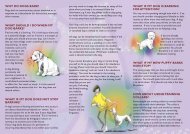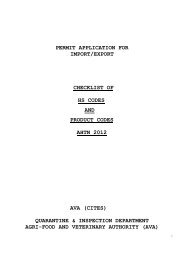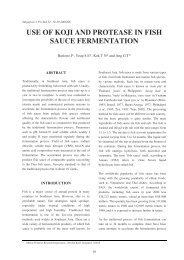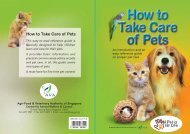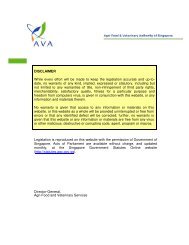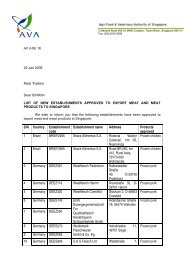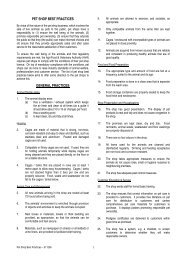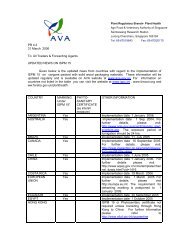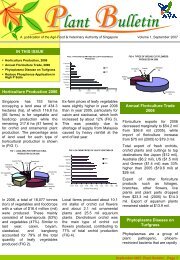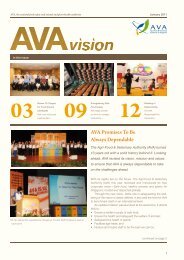2002/03 Annual report - Agri-Food & Veterinary Authority of Singapore
2002/03 Annual report - Agri-Food & Veterinary Authority of Singapore
2002/03 Annual report - Agri-Food & Veterinary Authority of Singapore
You also want an ePaper? Increase the reach of your titles
YUMPU automatically turns print PDFs into web optimized ePapers that Google loves.
From 1 July <strong>2002</strong>, AVA took over the<br />
prosecution <strong>of</strong> FCD cases, such as<br />
importing <strong>of</strong> food without registering,<br />
selling food with improper or misleading<br />
labels, and selling food with prohibited<br />
substances. A total <strong>of</strong> 383 cases were<br />
prosecuted in Court from 1 July <strong>2002</strong> to<br />
31 March 20<strong>03</strong>.<br />
Processed food that does not meet the<br />
standards <strong>of</strong> <strong>Food</strong> Regulations is not<br />
allowed for sale in <strong>Singapore</strong>. In FY02/<strong>03</strong>,<br />
a total <strong>of</strong> 489 summon actions were taken<br />
against processed food importers and<br />
manufacturers for various infringements <strong>of</strong><br />
the regulations.<br />
Continuous Vigilance Against Emerging<br />
Threats and Issues<br />
Maintaining Worldwide Surveillance for<br />
<strong>Food</strong> Issues and Threats<br />
AVA monitors the world food health<br />
situation daily for any food issues or<br />
potential food threats. We keep a close<br />
eye on updates on animal and plant<br />
health, zoonotic diseases and food safety<br />
standards <strong>of</strong> developed countries.<br />
An example <strong>of</strong> intensified vigilance was<br />
the increased surveillance <strong>of</strong> meat and<br />
fish products produced from China since<br />
February <strong>2002</strong>. This followed European<br />
Union’s <strong>of</strong>ficial ban on imports <strong>of</strong> China<br />
meat products due to the country’s<br />
widespread use <strong>of</strong> beta-agonist and<br />
chloramphenicol in their livestock and<br />
the use <strong>of</strong> formaldehyde and pesticide<br />
in some dried fishery products.<br />
AVA also intensified sampling <strong>of</strong> all<br />
seafood imported from Chile, to test for<br />
shellfish toxins, namely Amnesic Shellfish<br />
Poison, Paralytic Shellfish Poison and<br />
Diarrhetic Shellfish Poison following<br />
<strong>report</strong>s <strong>of</strong> an extension <strong>of</strong> the red tide<br />
outbreak in Southern Chile.<br />
Media <strong>report</strong>s provide valuable information<br />
for action. For instance, responding to<br />
media <strong>report</strong>s <strong>of</strong> abuse <strong>of</strong> antibiotics such<br />
as nitr<strong>of</strong>uran and choramphenicol in fish<br />
products from South-east Asian countries<br />
such as Myanmar, Vietnam and Indonesia,<br />
AVA intensified surveillance <strong>of</strong> seafood for<br />
such antibiotic abuse.<br />
The AVA regulates the safety <strong>of</strong><br />
all food from production right up<br />
to just before retail.<br />
Also in July <strong>2002</strong>, AVA was prompted to sample chicken parts<br />
from Thailand, Brazil and Holland following a media <strong>report</strong> that<br />
pork and beef powders were being added to chicken parts in<br />
Holland to increase the absorption <strong>of</strong> water and therefore the<br />
weight <strong>of</strong> the chicken parts. No such cases were detected.<br />
Managing <strong>Food</strong> Risks Through Industry<br />
Collaboration and Education<br />
Consultations and Dialogues with Industry<br />
During the year, numerous dialogue<br />
sessions were held with industry<br />
representatives to address their concerns<br />
and queries as well as enlist their cooperation<br />
in AVA’s quest towards higher<br />
food safety standards.<br />
AVA met up with companies to discuss<br />
a range <strong>of</strong> issues from the import <strong>of</strong> GM<br />
seeds, the feasibility <strong>of</strong> importing and reexporting<br />
airline meals from Australia to<br />
the restrictions on the transhipment <strong>of</strong><br />
certain food products.<br />
Eleven dialogue sessions were held from<br />
7–30 October between the licensees <strong>of</strong><br />
food establishments and AVA. Conducted<br />
in Mandarin, the sessions updated the<br />
licensees on the change in licensing<br />
authority, various food control and food<br />
safety issues, as well as gathered<br />
feedback from the participants on how<br />
AVA could better serve their needs. Prior<br />
to the registration exercise for importers <strong>of</strong><br />
processed food from 15 November <strong>2002</strong>,<br />
AVA also held four dialogue sessions to<br />
brief participants on the new import<br />
requirements and garner feedback.<br />
AVA held separate dialogue sessions<br />
in February and March 20<strong>03</strong> to brief<br />
importers <strong>of</strong> coconut milk, grated<br />
coconut, desiccated/shelled coconut and<br />
infant formulae on various issues, such as<br />
the online processing <strong>of</strong> import permits,<br />
usage <strong>of</strong> refrigerated vehicles for<br />
transportation <strong>of</strong> products, and packaging<br />
and labelling requirements.<br />
To facilitate trade activities, AVA and JTC<br />
Corporation worked together to discuss<br />
the conversion <strong>of</strong> non-food factory blocks<br />
at Woodlands Spectrum into food<br />
factories in order to cater for the high<br />
demand <strong>of</strong> food factories in the market.<br />
AVA also discussed with Housing and<br />
Development Board (HDB) the types <strong>of</strong><br />
trading activities allowable at EASTLink –<br />
a light and clean industrial block at Bedok.<br />
The activities are aimed at facilitating<br />
HDB’s future allocation <strong>of</strong> its industrial<br />
premises at designated wings.<br />
Workshops and Training Courses<br />
To upgrade the food safety and hygiene<br />
standards <strong>of</strong> the members <strong>of</strong> the food<br />
industry, AVA regularly conducts courses,<br />
seminars and workshops.<br />
In June <strong>2002</strong>, AVA co-hosted a two-day<br />
HACCP workshop with the Australian<br />
Pork Limited. The aim <strong>of</strong> the workshop<br />
was to facilitate the development and<br />
implementation <strong>of</strong> HACCP-based food<br />
safety system by the AVA-licensed<br />
deboning establishments involved in<br />
supplying Australian chilled pork (AIRPORK)<br />
to the retail markets in <strong>Singapore</strong>.<br />
Two courses on “<strong>Food</strong> Hygiene, Quality<br />
and Safety” for supervisors and managers<br />
<strong>of</strong> food factories, jointly organised by<br />
Regular checks are conducted<br />
to ensure strict adherence to food<br />
labelling standards to protect<br />
consumer interests.<br />
Page 28 Page 29


